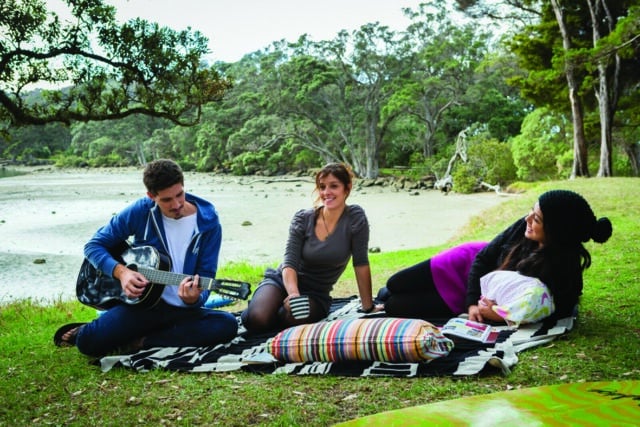
IF YOU HAD told me when I was in Year 13 that it would take me nine years to complete a degree, I wouldn’t have believed you.
I had excellent academic results, scholarship offers to two universities and I’d spent time on university campuses as part of various science camps. As far as I was concerned, I couldn’t possibly be more prepared.
I chose to move to Auckland for university, and it didn’t take long to realise how very wrong I had been about my preparedness.
Three weeks after moving to Auckland, I flew home for the weekend and found myself in tears when I had to get on the plane back to Auckland, for reasons I couldn’t really articulate.
Things deteriorated from there.
I cried during lectures and developed such a fear of the dining hall at my hall of residence that by the second semester I was surviving entirely off foods I could keep in my room.
Despite these challenges, I did ultimately decide to return to Auckland the following year.
This time I was living in a studio apartment, which proved to be a much better living situation for me. That second year was successful, I was even happy to stay in Auckland over the summer to complete a summer studentship.
For some reason, however, things deteriorated again in my third year, to the point that I was unable to complete my second semester exams. Although I was doing a conjoint degree and had another year of study to go, I decided not to return to Auckland for my fourth year.
My scholarship had run out and that was really the only thing keeping me in Auckland by that point. I moved home to Wellington, and whilst I did complete a couple of papers through Massey University with the intention of crediting them back to my Auckland degree, my heart was no longer in it.
Although I had actually completed enough papers to earn a BA, I chose not to formally graduate.
In Wellington I reconnected with my old dance school, first taking classes there, and eventually getting some teaching work. I realised just how important dance was in my life; attending dance classes had been one of the things that made living in Auckland easier.
I decided to enrol in a tertiary dance course in Wellington, and it is from that course that I finally graduated last year. That journey was certainly not without its challenges; it took me five years to complete a three-year course, in part because I had to have a year off for surgery, but also because I developed severe anxiety during the first lockdown and ended up needing to take an extra year to complete the third year of the course.
However, I always felt supported by my tutors to take things at my own pace, and I’m super proud that I can finally say I have a degree (even if I don’t have the cap and gown photos to prove it, thanks to Omicron!)
When I was in my final year at school, I assumed that I was ready for university because I was academically prepared. I assumed that because I had spent two or three weeks away from home at various times on science camp, I was prepared for living in a hall of residence.
I quickly realised that, for me at least, academic preparedness was probably the least important consideration in transitioning to tertiary study. This transition is a major life change, it may well be the biggest change you have ever been through, especially if you move to a new city for study.
There are a number of factors to weigh up when choosing where and what to study. In hindsight, I focussed too much on the prestige of the institution I wished to study at, and not enough on whether it was the right fit for me.
Here are three key factors that I wish I had given more consideration to in deciding my next steps after school.

Tertiary study is a big change from secondary school; you generally have a lot less oversight from your teachers and are expected to be more independent in reaching out for help.
Personally, however, I could have coped with those differences; what made university study so challenging for me was that I moved to a completely different city for it.
Living in a hall of residence and living independently are both big transitions: for me, the social aspects of hall life, such as navigating where to sit in the dining hall, provoked major anxiety.
Whilst living in my studio apartment was definitely better, I still found things like planning and preparing meals difficult. Even now, I have to stick to a routine of what I will eat each day or I simply forget to eat!
Furthermore, moving to a new city meant I lost contact with all my social networks.
Some of those relationships would have changed simply due to leaving school, of course, my closest relationships during my school years were with my teachers, and whilst I wouldn’t say I was close friends with any of my peers, I definitely enjoyed seeing them every day.
However, being in Auckland also meant I lost contact with my dance teachers and friends, and my relationship with family switched to being based mostly on texts and emails. Whilst I tried to make new friendships in Auckland by signing up for dance classes and joining university clubs, I couldn’t replace the established relationships with people I’d known for years that I had left behind in Wellington.
On reflection, I think I would have been much more likely to succeed at university study if I had stayed in Wellington. This approach would have meant I could spread the changes out, perhaps I could have lived at home during my first year, and then tried flatting once I was more used to university study. It would also have meant I could continue my dance classes and see my family regularly.
Class Size
One of the things I have learnt about myself during my time in tertiary education is the importance of having strong relationships with my teachers.
I found I much preferred small class sizes, my dance course is an example of this, but even at university I enjoyed my language classes the most, because the small class sizes meant you actually got to know your tutors.
In a class where everyone knows you, you automatically get some social interaction in your day, whereas if you only do large lecture classes, it is quite easy to go whole days without talking to anyone!
Perhaps more importantly, when your teachers know and value you as an individual, it is much easier to ask them for accommodations; people who know you are generally willing to work with you to find a way you can meet the requirements of the course, whereas in a larger class you are often just a number and it can be harder to convince people that you do need accommodations.
If I ever enrol for further tertiary study, small class sizes or the ability to work one-on-one with the teacher will be the key thing I look for in a course.
Routines
Routines are incredibly important to me in managing my day-to-day life.
I struggle with establishing my own routines; I get very anxious when I have large amounts of unscheduled time.
This manifests itself in the workplace, where I have never survived a typical office job for more than about eight weeks, I tend to do much better with jobs like teaching, where the routine is already pre-planned.
It also manifests itself in tertiary education: one of the things I liked the most about my dance course was that it was like school, with most of our time spent in scheduled classes.
In contrast, the fact that a day at university could involve just one or two classes and large amounts of unscheduled time, plus the fact that no two days were ever the same, made having any sort of routine very difficult. If I ever were to return to university-style study, I would do so part-time so that I could also work. If I had work to create a sense of routine in my days, I would be better able to cope with the unstructured nature of university study.
Of course, the weight you are able to give these factors when making decisions about your own tertiary education does depend on what you want to study; if you want to do medicine, for example, your only choices are Auckland or Otago and there is nothing you can do about the large class sizes of the first year courses.
It is important, however, to give weight to the things you know will help you to learn effectively and with the least amount of stress possible.
Remember, too, that tertiary education will be there waiting for you when you are ready for it; it truly is a journey that you can take at your own pace.
I doubt I would have been successful on my dance course had I enrolled in it straight out of school, as I definitely wasn’t ready for the emotional demands of the course.
Windy as the road has been, my tertiary education journey to date has been the right path for me. I hope that all autistic students are eventually able to find their own right path, and that by considering the factors discussed here, you might be able to avoid some of the stumbling blocks I tripped over.

Dancer Rachael Wiltshire. Photo credit: Stephen A’Court. COPYRIGHT ©Stephen A’Court


